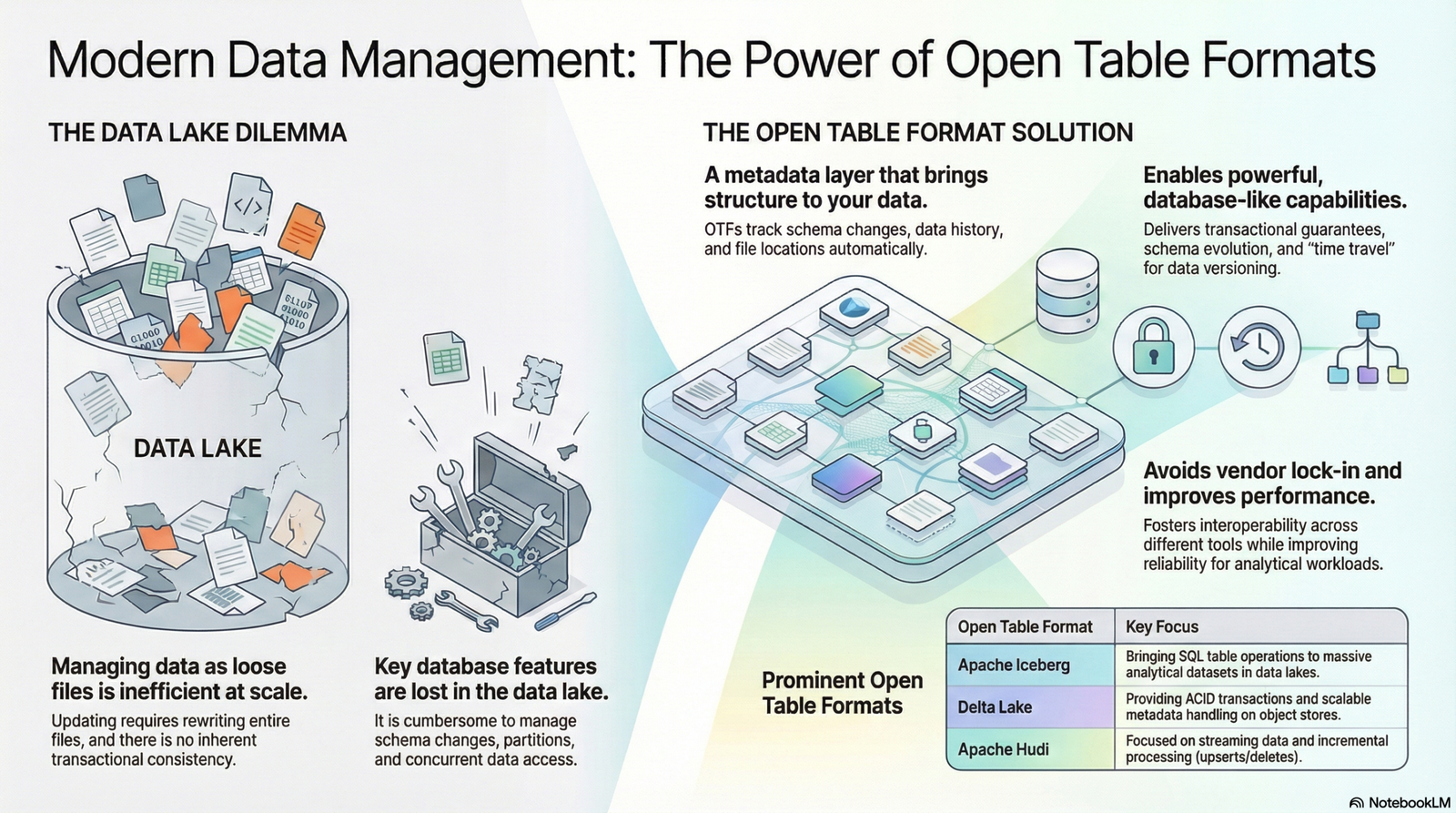Understanding Open Table Formats and Their Importance in Data Engineering
Estimated reading time: 15 minutes
Key Takeaways:
- Open table formats are standardized specifications for organizing and storing tabular data, prioritizing transparency, interoperability, and portability.
- Open table formats are crucial in data engineering for efficient data management, particularly in data lakehouse environments.
- They enable schema evolution, data version control, improved concurrency, and performance while avoiding vendor lock-in.
Table of Contents:
What is an Open Table Format?
Why Are Open Table Formats Important in Data Engineering?
Common Examples of Open Table Formats
Role in Modern Data Architectures
Benefits of Open Table Formats
Implementation of Open Table Formats
Future of Open Table Formats
What is an Open Table Format?
In the rapidly evolving field of data engineering, understanding open table formats (OTFs) is crucial for efficient data management. An **open table format** is a standardized, publicly accessible specification for organizing and storing tabular data across different systems and platforms. This format prioritizes transparency, interoperability, and portability, allowing data to be accessed, processed, and exchanged seamlessly across various technologies and organizations.
At its core, an open table format acts as a metadata system layered on top of the actual data files, often stored in object storage or distributed file systems. This metadata tracks:
- Schema and partition changes (DDL – Data Definition Language).
- Data file locations and statistics.
- All data modifications, including Inserts, Updates, and Deletes (DML – Data Manipulation Language).
- Table state history, enabling features like time travel to query historical data states.
- Support for concurrent reads and writes.
By maintaining a chronological series of metadata files, OTFs allow data engineers to manage large, evolving datasets with more agility compared to traditional file formats.
Why Are Open Table Formats Important in Data Engineering?
Traditional relational databases provide CRUD operations and transactionality guarantees, but these are typically lost when moving data to object storage. Managing tables as loose collections of files becomes challenging, especially at scale, because:
- Updating data requires rewriting entire files.
- There is no inherent transactional consistency across multiple files.
- Schema evolution and partition management are cumbersome.
Open table formats bridge this gap by offering a table abstraction that brings SQL-like capabilities and transactional integrity to data lakes and lakehouse architectures. They enable schema evolution and partition pruning, allowing flexible adaptation of data structures over time without rewrites or downtime. Additionally, they provide transactional guarantees, support concurrent access, and enable time travel and data versioning.
Common Examples of Open Table Formats
Prominent open table formats include:
| Open Table Format | Description |
| Apache Iceberg | Designed to bring SQL table-like operations to large analytical datasets in data lakes. Supports schema evolution, partitioning, and transactional consistency. |
| Delta Lake | Provides ACID transactions and scalable metadata handling on top of object stores. |
| Apache Hudi | Focused on streaming data and incremental processing with support for upserts and deletes. |
Each addresses similar data management challenges but with slightly different approaches and community ecosystems.
Role in Modern Data Architectures
Open table formats are particularly critical in data lakehouse environments, which combine the scalability of data lakes with the management and performance features of data warehouses. They allow large analytical datasets stored in object stores to be managed more like traditional tables with robust transactional semantics and metadata layers optimized for modern data workloads.
Summary
Open table formats represent a significant advancement in data engineering by marrying the scalability of data lakes with the transactional robustness and flexibility traditionally found in relational databases. They are essential for building sustainable and scalable data infrastructures, enabling schema evolution and data version control, improving concurrency and performance, and avoiding vendor lock-in.
Benefits of Open Table Formats
- Enabling schema evolution and data version control
- Improving concurrency, performance, and reliability of analytical workloads
- Avoiding vendor lock-in and fostering interoperability across tools and platforms
- Building sustainable and scalable data infrastructures
- Supporting time travel and data versioning
Implementation of Open Table Formats
Implementing open table formats requires a thorough understanding of data engineering principles and data management systems. Data engineers should consider the following steps:
- Select an open table format that meets their organization’s needs
- Design a data management system that incorporates the chosen open table format
- Implement data governance policies to ensure data quality and consistency
- Monitor and optimize data storage and processing performance
Future of Open Table Formats
The future of open table formats is promising, with increasing adoption in data lakehouse environments and growing support from major cloud providers. As data continues to grow in volume and complexity, open table formats will play a critical role in enabling efficient data management and analytics.
Conclusion
In conclusion, understanding open table formats and their importance in data engineering is essential for efficient data management. Open table formats offer a standardized, publicly accessible specification for organizing and storing tabular data, prioritizing transparency, interoperability, and portability. By implementing open table formats, data engineers can enable schema evolution and data version control, improve concurrency and performance, and avoid vendor lock-in.


